ARQ Wealth Advisors Q1 2023 Commentary: The Storm Before the Calm
By Richard Siegel, CFP®
Well, 2023 is off to an interesting start. Stronger than expected economic data, a stubbornly tight labor market, the Fed putting the fear of over-tightening on the table and of course several recent bank failures all factored into the first quarter’s market turbulence and surprisingly positive returns. Although the Fed Funds Rate is currently sitting at a whopping 5%, other Treasury rates have fallen, signaling that the market thinks the Fed has overplayed its hand and will have to lower rates by the end of 2023. This has caused bond prices to move up and interest rate sensitive sectors like technology to outperform over the last few months.
 What could have become another major financial crisis looks to have been averted and is now more like a “clean up in aisle 7” scenario. By taking such aggressive monetary policy action thus far, the Fed has proven that it is willing to “break something” to tamp down inflation. With the housing market cooling off, the banking system showing cracks and corporate earnings growth slowing, we think the end is near for this tightening cycle, but let’s not get ahead of ourselves.
What could have become another major financial crisis looks to have been averted and is now more like a “clean up in aisle 7” scenario. By taking such aggressive monetary policy action thus far, the Fed has proven that it is willing to “break something” to tamp down inflation. With the housing market cooling off, the banking system showing cracks and corporate earnings growth slowing, we think the end is near for this tightening cycle, but let’s not get ahead of ourselves.
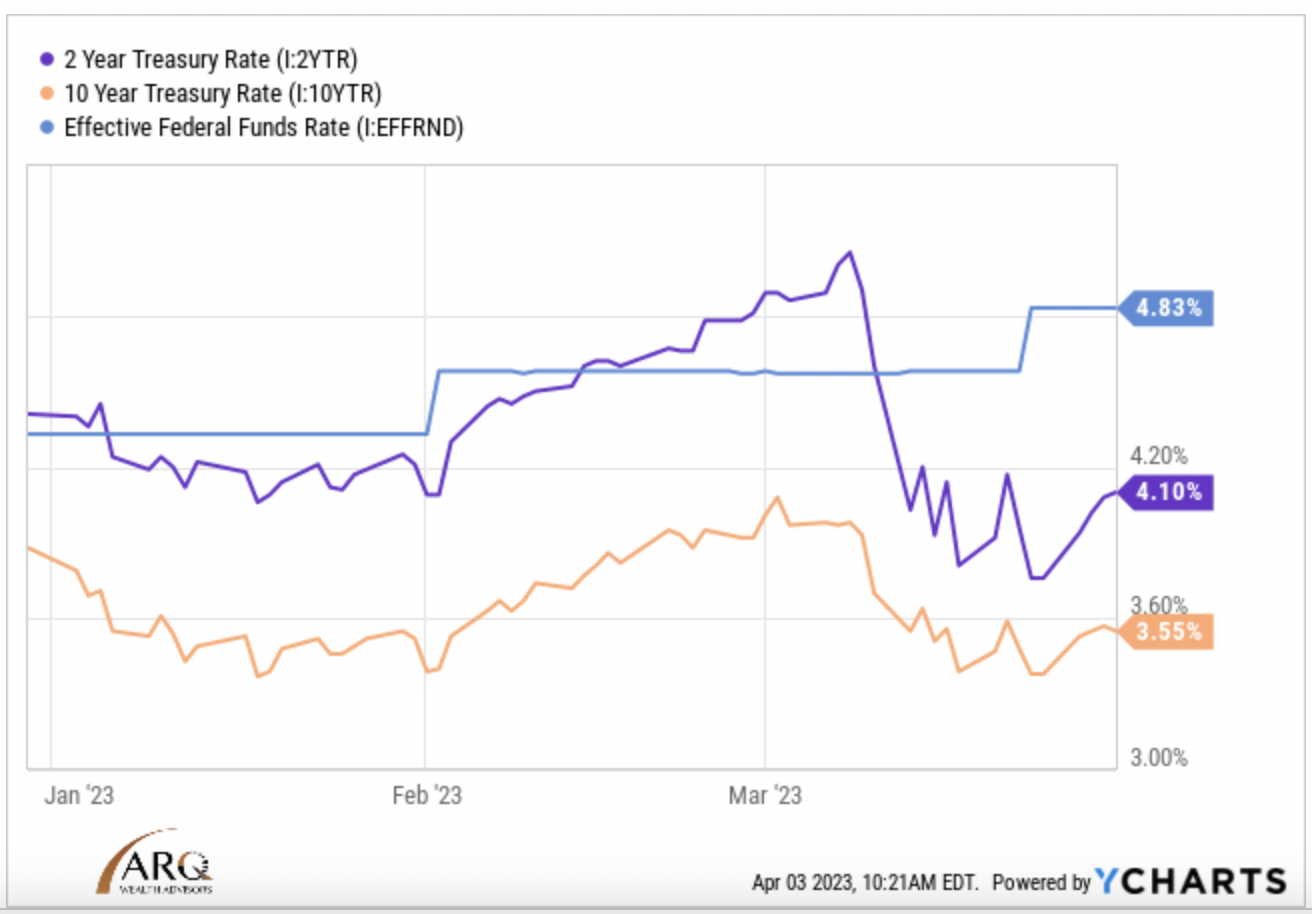
There are still structural issues at this stage of the economic cycle and we as money managers, continue to err on the side of vigilance.
There is no such thing as an “all clear” signal, but further proof that inflation is indeed falling to more acceptable levels and the Fed is willing to back off would be a great start. Until there is evidence that this “hawkish” monetary policy regime is transitioning to a more “dovish” one, we see continued stormy weather ahead with periods of sunshine.
Economic Overview
According to the Atlanta Fed’s GDPNow model, Q1 2023 economic output should once again be positive on a year-over-year basis. Up to this point in the economic cycle, the U.S. consumer has been able to fight off high inflation and high interest rates based on a very strong labor market, high wage inflation, and cash reserves left over from the pandemic. Now, as cash dries up, debt builds, and higher rates persist, there are multiple reasons to expect that we will enter into an economic contraction later in 2023. Here are several of the factors that could cause the U.S. to enter into a recession:
- As higher interest rates and lay-offs begin to take more of a foothold, consumer spending should tail off.
- The yield curve is inverted, meaning short-term rates are higher than long-term rates, making it less attractive for banks to lend.
- The manufacturing sector has been contracting for a few quarters.
- Money supply (M2) has collapsed over the past few quarters, making access to capital more difficult.
- The Index of Leading Economic Indicators (LEI) has moved into negative territory, which is a decent predictor of recession.
 As we wrote in our last commentary, recessions are a normal part of the economic cycle (about one every five years), and shallow recessions aren’t really something long-term investors need to lose too much sleep over. It would really take a “hard landing,” such as the Great Financial Crisis for our view to turn into broad pessimism. At this point, everyone expects to have a recession in the near term and much of that view should already be priced into the capital markets. Other important considerations…certain asset classes do very well during recessions and stocks have actually turned in positive returns in about 50% of recessionary periods. We are positioned accordingly.
As we wrote in our last commentary, recessions are a normal part of the economic cycle (about one every five years), and shallow recessions aren’t really something long-term investors need to lose too much sleep over. It would really take a “hard landing,” such as the Great Financial Crisis for our view to turn into broad pessimism. At this point, everyone expects to have a recession in the near term and much of that view should already be priced into the capital markets. Other important considerations…certain asset classes do very well during recessions and stocks have actually turned in positive returns in about 50% of recessionary periods. We are positioned accordingly.
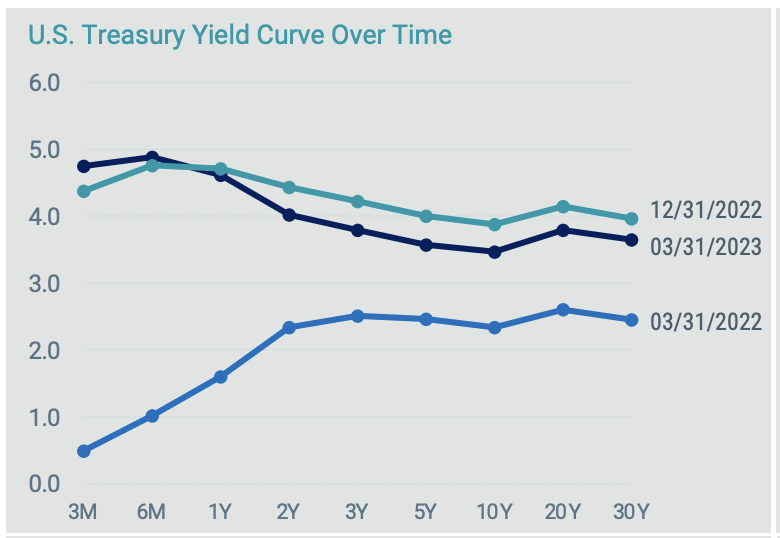
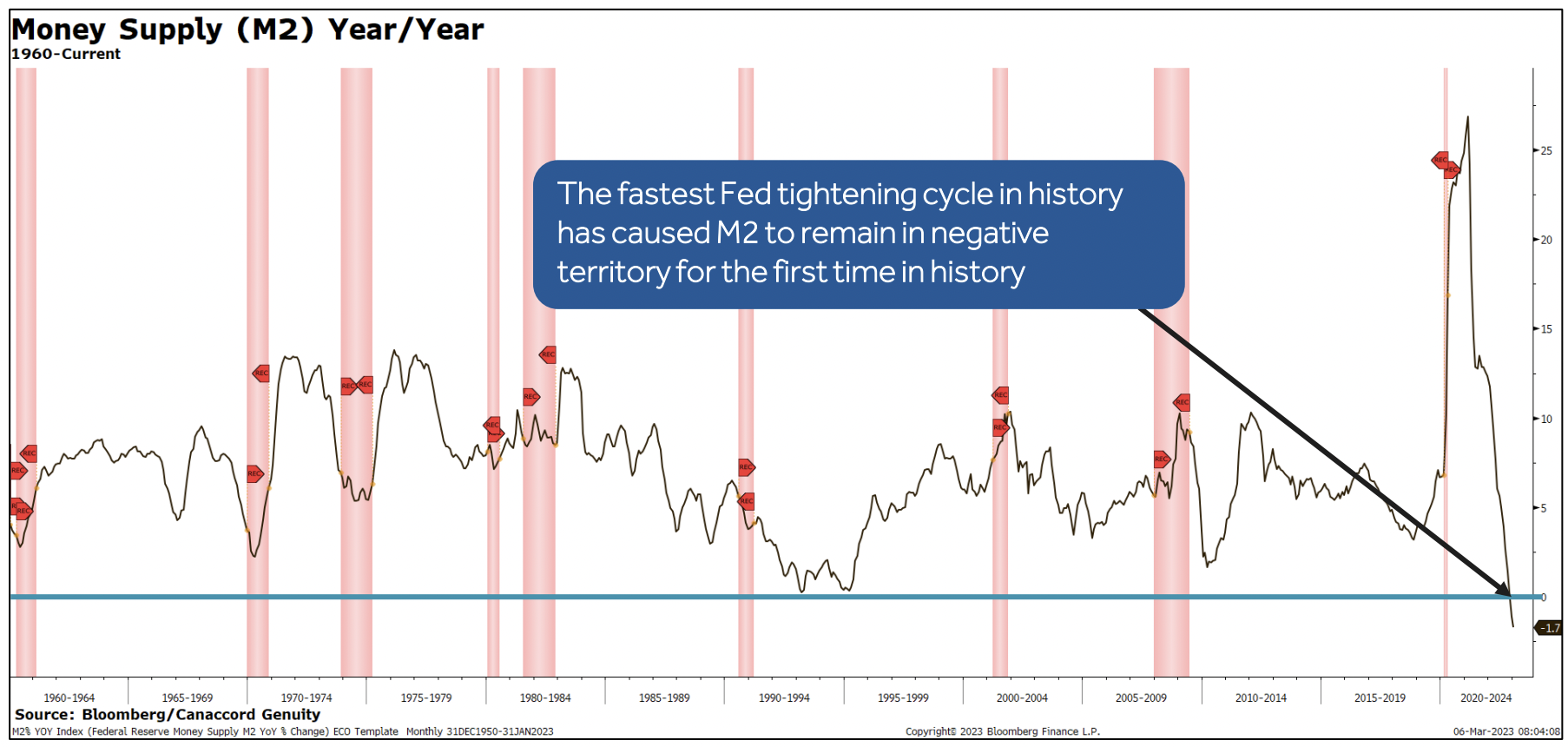
Equity Markets Overview
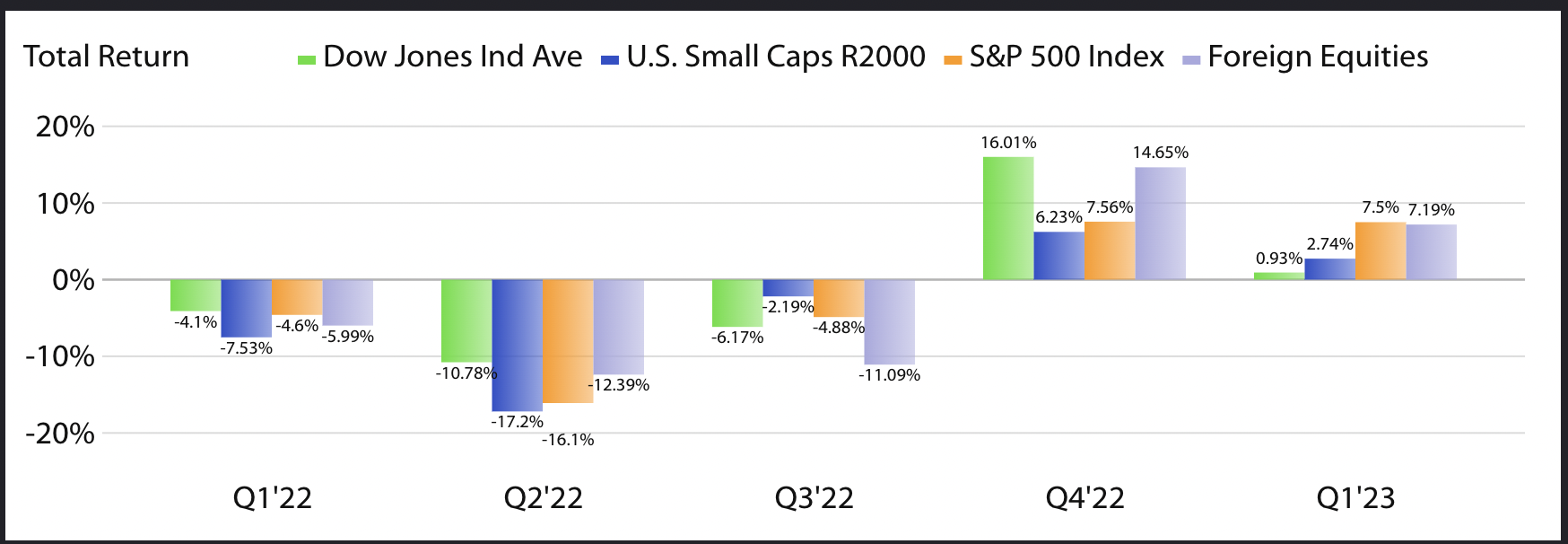 Q1’s equity returns mark the second consecutive quarter of strong results. We have a long way to go to recover all of the losses from 2022, but so far, so good. Why has the market done well if we may be heading into a recession? The market is a forward pricing mechanism and is therefore looking out several months and pricing in many factors that can be construed as good news:
Q1’s equity returns mark the second consecutive quarter of strong results. We have a long way to go to recover all of the losses from 2022, but so far, so good. Why has the market done well if we may be heading into a recession? The market is a forward pricing mechanism and is therefore looking out several months and pricing in many factors that can be construed as good news:
- Lower inflation
- A Fed pivot in monetary policy
- China’s economy reopening
- A bottoming in the corporate earnings contraction
- A systemic banking crisis averted
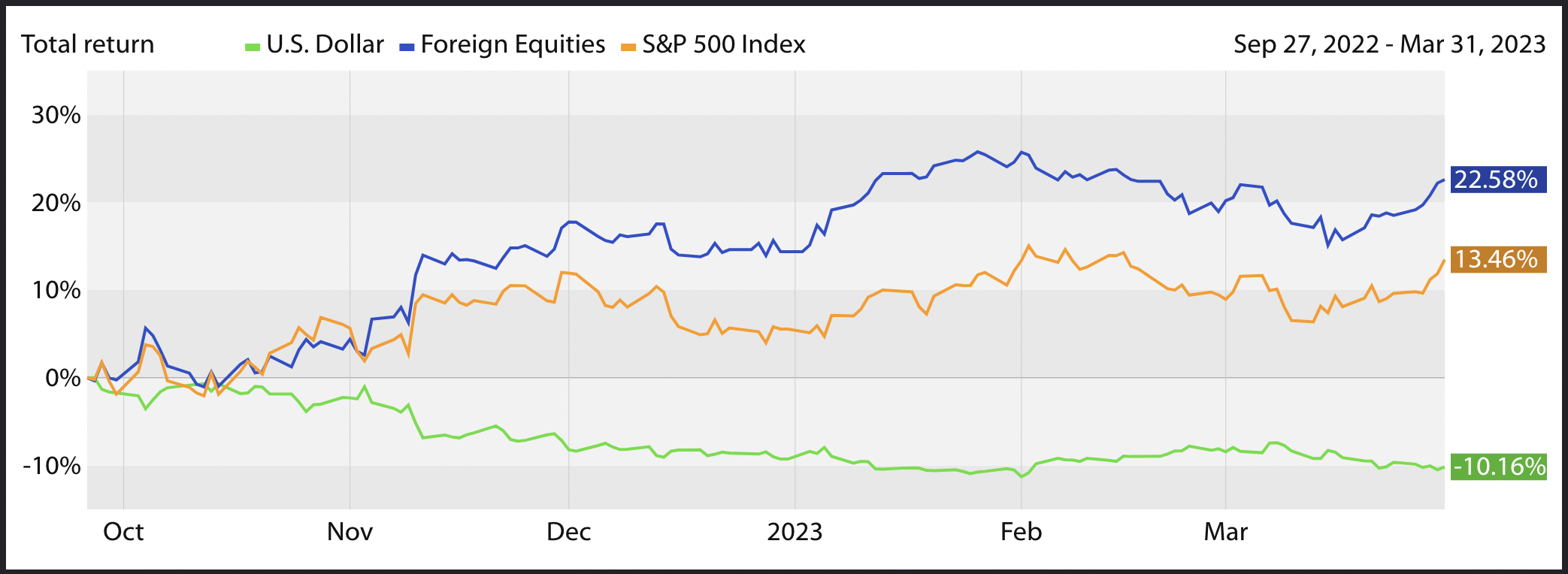 To reiterate, we are definitely not of the opinion that there is any type of all clear signal here. In fact, we used the recent market strength in January and February to take some chips off the table. As a firm, we moved between 6% – 12% stock exposure in client portfolios into the safety of money market funds. These funds are currently yielding over 4.50%. It’s been about 15 years since money markets and CDs have yielded over 4%, so we were excited to capitalize on the opportunity. From a tactical standpoint, our plan is to unwind this cash position over the next several months as more favorable conditions present themselves in the equity markets.
To reiterate, we are definitely not of the opinion that there is any type of all clear signal here. In fact, we used the recent market strength in January and February to take some chips off the table. As a firm, we moved between 6% – 12% stock exposure in client portfolios into the safety of money market funds. These funds are currently yielding over 4.50%. It’s been about 15 years since money markets and CDs have yielded over 4%, so we were excited to capitalize on the opportunity. From a tactical standpoint, our plan is to unwind this cash position over the next several months as more favorable conditions present themselves in the equity markets.
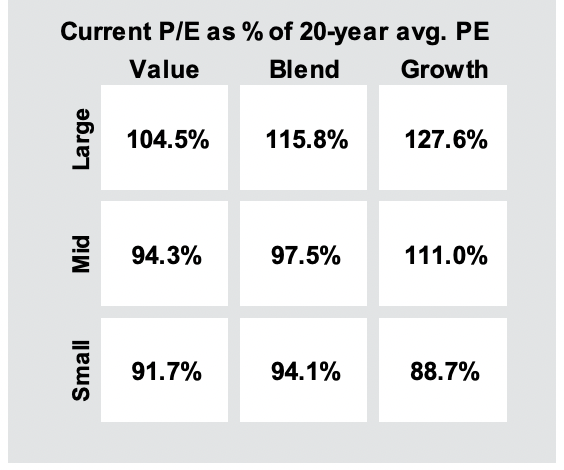 Foreign equities have been outperforming U.S. stocks over the past 2 quarters. This can be attributed to a weakening U.S. dollar (USD peaked 9/27/22) and the more attractive valuations of these markets (currently 29% cheaper relative to historical averages). In fact, foreign equities have outperformed U.S. equities by 6% over the past 15 months. Historically, domestic and foreign markets outperform each other in cycles, and it appears that a changing of the guard may have already begun. Another recent dynamic is the Dow and S&P 500 have dramatically changed leadership roles in recent months. The Dow is more heavily weighted in cheaper, more defensive sectors whereas the S&P is heavily weighted in more expensive growth sectors. Last year’s drubbing of the overpriced, interest rate sensitive technology sector transitioned into an impressive Q1 rebound as Treasury yields pulled back on speculation that the Fed will have to lower rates in the next several months. This remains to be seen, and we are taking a balanced approach to growth and value exposure at this point, with a bias toward lower valuation stocks. Lastly, mid and small cap stocks have been under pressure in recent months due to their heavy exposure to the financial sector; as you can see from the chart to the right, the best values in the U.S. stock market are currently in the mid and small cap space.
Foreign equities have been outperforming U.S. stocks over the past 2 quarters. This can be attributed to a weakening U.S. dollar (USD peaked 9/27/22) and the more attractive valuations of these markets (currently 29% cheaper relative to historical averages). In fact, foreign equities have outperformed U.S. equities by 6% over the past 15 months. Historically, domestic and foreign markets outperform each other in cycles, and it appears that a changing of the guard may have already begun. Another recent dynamic is the Dow and S&P 500 have dramatically changed leadership roles in recent months. The Dow is more heavily weighted in cheaper, more defensive sectors whereas the S&P is heavily weighted in more expensive growth sectors. Last year’s drubbing of the overpriced, interest rate sensitive technology sector transitioned into an impressive Q1 rebound as Treasury yields pulled back on speculation that the Fed will have to lower rates in the next several months. This remains to be seen, and we are taking a balanced approach to growth and value exposure at this point, with a bias toward lower valuation stocks. Lastly, mid and small cap stocks have been under pressure in recent months due to their heavy exposure to the financial sector; as you can see from the chart to the right, the best values in the U.S. stock market are currently in the mid and small cap space.
Bond Market Overview
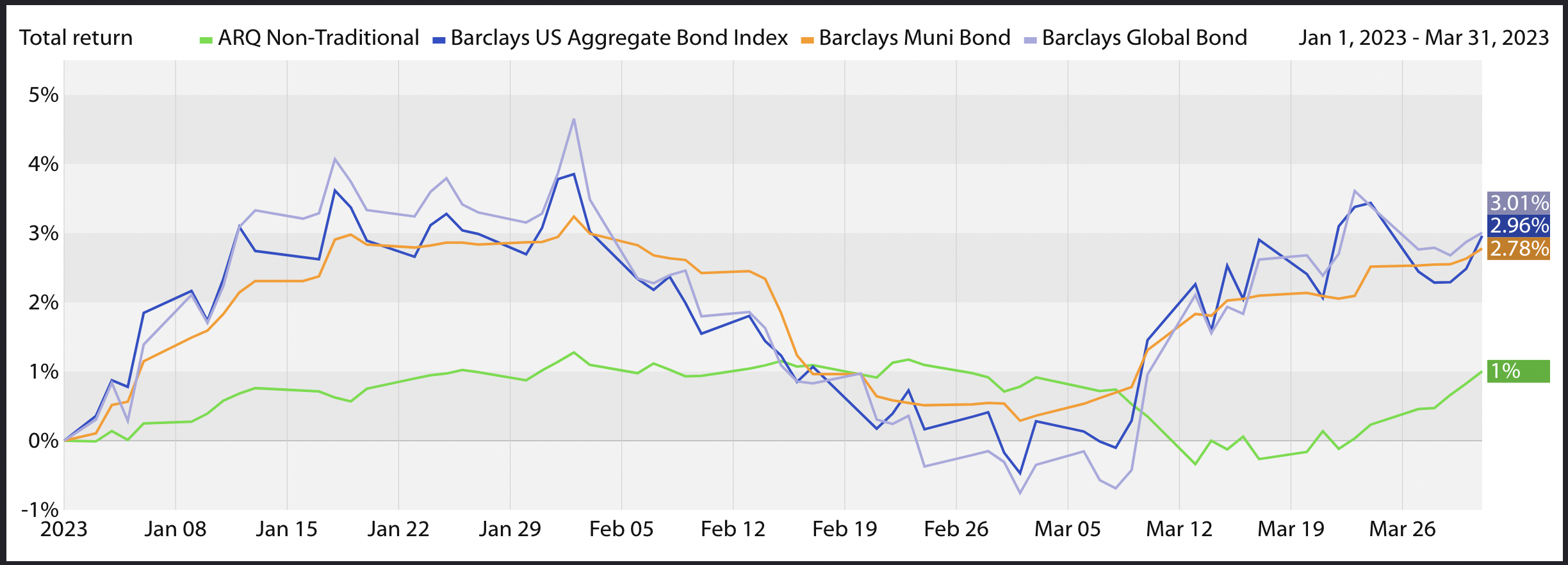 Consistent with the strong stock market returns over the past three months, bonds turned in impressive gains as Treasury yields retraced from their recent high water mark. Even though bonds have done well in recent months, they are still quite attractive from a price and yield perspective. High quality bonds also do very well in a recessionary environment, as a flight to safety pushes prices up and yields down. Over the past several months we’ve increased duration from approximately 4 years to 5 years. So assuming there is a recession, this will increase both the return and stock market hedging potential within client portfolios.
Consistent with the strong stock market returns over the past three months, bonds turned in impressive gains as Treasury yields retraced from their recent high water mark. Even though bonds have done well in recent months, they are still quite attractive from a price and yield perspective. High quality bonds also do very well in a recessionary environment, as a flight to safety pushes prices up and yields down. Over the past several months we’ve increased duration from approximately 4 years to 5 years. So assuming there is a recession, this will increase both the return and stock market hedging potential within client portfolios.
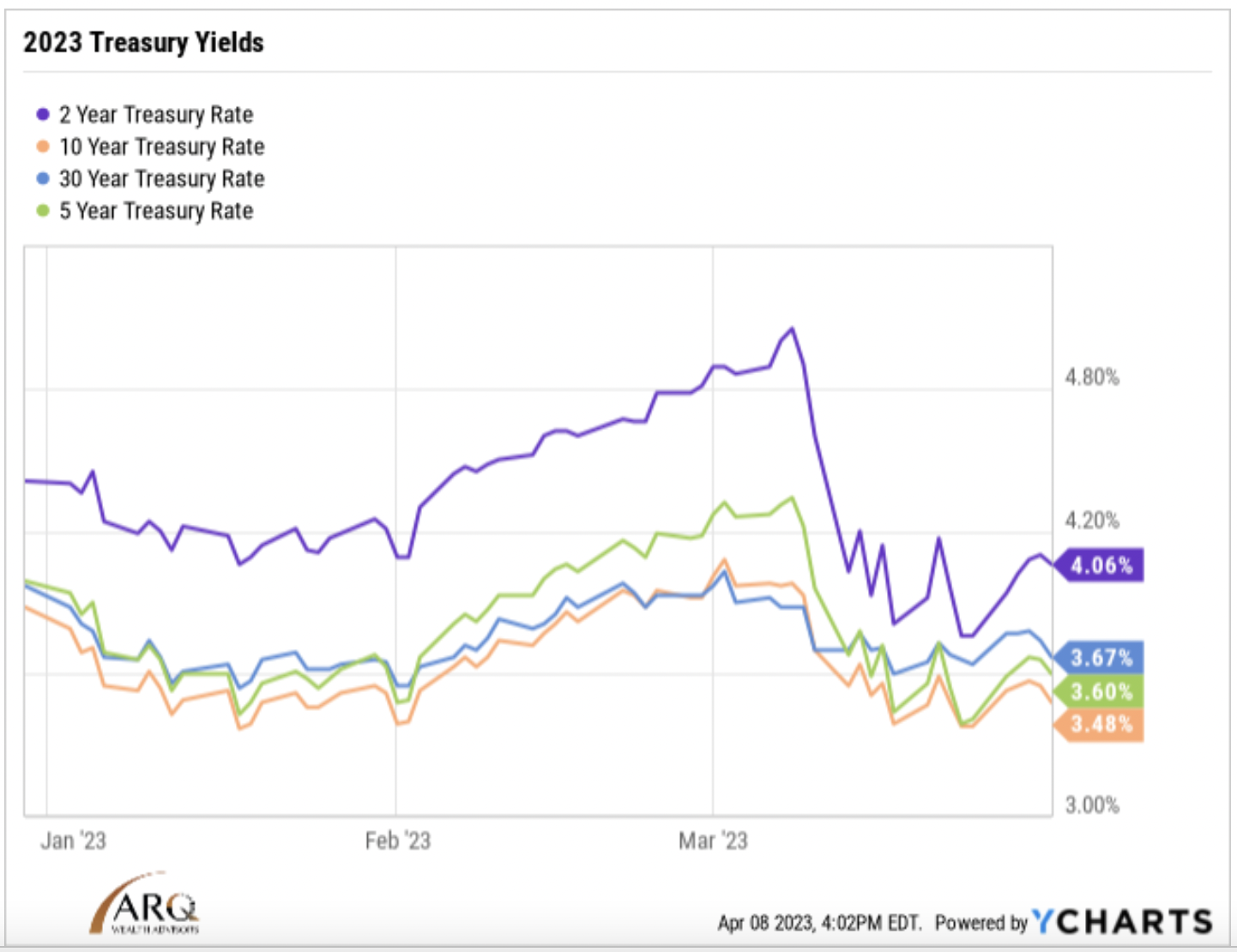 The non-traditional holdings within our strategies lagged a bit in Q1 as they have little to no interest rate sensitivity.
The non-traditional holdings within our strategies lagged a bit in Q1 as they have little to no interest rate sensitivity.
Rates have pulled back hard in the latter part of the quarter. The 2-year Treasury yield is most tightly correlated to the Fed Funds rate, and you can see just how dramatically the yield collapsed over the past month, from over 5% down to 4%. This was exacerbated by the recent mini banking crisis. Essentially, rates are front-running the Fed and predicting that it will need to reverse course in the next several months. We are witnessing extreme levels of volatility in the fixed income markets due to this push/pull dynamic. We’ve been able to tamp down some of this volatility by controlling the duration and credit quality of fixed income securities with our strategies.


